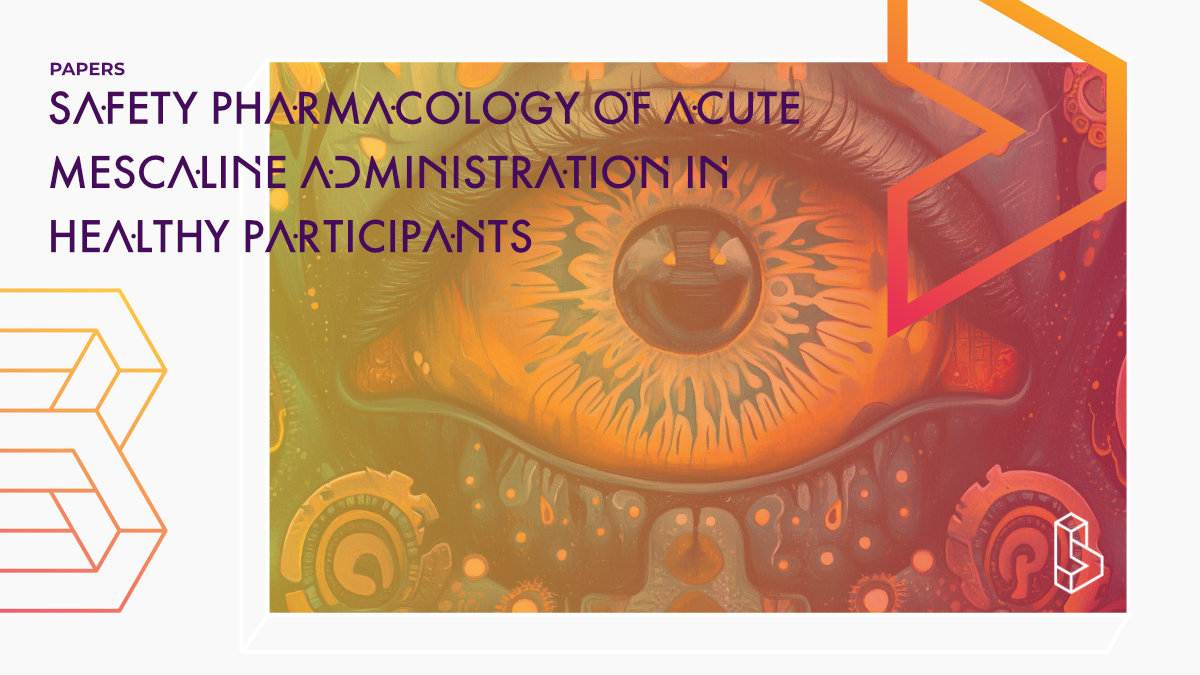This pooled analysis of two RCTs (n=48) investigates the safety of mescaline in single oral doses of 100–800 mg (96 administrations). Positive subjective effects increased dose-dependently, while autonomic effects were moderate. Adverse effects, including nausea (dose-limiting), were recorded, but no significant issues with liver/kidney function or blood cell counts occurred. “Flashbacks” were reported in 2% of administrations. Mescaline doses up to 800 mg were deemed safe in a controlled clinical setting for healthy participants.
Abstract of Safety pharmacology of acute mescaline administration in healthy participants
“Aims Psychedelics, including mescaline, may serve as novel treatments for depression and anxiety. However, data is scarce on the safety of mescaline.
Methods The present pooled analysis included two double-blind, randomized, placebo-controlled studies with a total of 48 participants and 96 mescaline administrations. Single oral-dose administrations (n = 16/dose) of mescaline at doses of 100–800 mg were used. Acute subjective and autonomic effects and acute and subacute adverse effects were recorded. Liver and kidney function, blood cell counts, and “flashbacks” were documented at the end of the studies.
Results Positive subjective effects dose-dependently increased and were higher than negative subjective effects for all mescaline doses. Autonomic effects increased moderately. Systolic blood pressure remained < 180 mmHg in all participanhts. Of all mescaline administrations, diastolic blood pressure > 100 mmHg was measured in 6%, heart rate > 100 beats/min was measured in 3% and body temperature > 38 °C was measured in 5%. The total number of acute adverse effects was 51, 12, 179, 143, 165 and 180 at 100, 200, 300, 400, 500 and 800 mg doses of mescaline, respectively. Nausea was dose-limiting. Kidney and liver function and blood cell counts remained normal. “Flashbacks” were reported after 2% of all mescaline administrations.
Conclusions These findings suggest that the administration of single mescaline doses up to 800 mg are safe in a controlled clinical setting with regard to acute psychological and physical harm in healthy participants.”
Authors: Aaron Klaiber, Mélusine Humbert-Droz, Laura Ley, Yasmin Schmid & Matthias E. Liechti
Summary of Safety pharmacology of acute mescaline administration in healthy participants
Mescaline, a classic serotonergic psychedelic, has a long history of use in traditional and therapeutic contexts. It acts primarily by stimulating the 5-HT2A receptor, which leads to acute changes in perception and consciousness. Mescaline is derived from cacti like peyote and San Pedro and was first isolated in 1896. Historically, it has been used in both indigenous rituals and early psychiatric research for mimicking psychosis symptoms. However, since the 1970s, regulatory restrictions curtailed research into its effects.
Recent years have seen a resurgence of interest in psychedelics, including mescaline, for mental health applications. Preliminary studies have demonstrated its ability to increase blood pressure, heart rate, and body temperature, akin to substances like LSD and psilocybin. Nevertheless, controlled safety data, especially across varying doses, remain scarce. The current analysis combines data from two Phase I trials, investigating acute subjective, autonomic, and adverse effects of mescaline at doses ranging from 100 to 800 mg. The researchers focused on clinically relevant metrics, including extreme cardiovascular responses, adverse effects, and changes in liver and kidney function.
Methods
Study Design
Find this paper
Safety pharmacology of acute mescaline administration in healthy participants
https://doi.org/10.1111/bcp.16349
Open Access | Google Scholar | Backup | 🕊
Cite this paper (APA)
Klaiber, A., Humbert‐Droz, M., Ley, L., Schmid, Y., & Liechti, M. E. (2024). Safety pharmacology of acute mescaline administration in healthy participants. British Journal of Clinical Pharmacology.
Study details
Compounds studied
Mescaline
Topics studied
Safety
Healthy Subjects
Study characteristics
Original Re-analysis
Placebo-Controlled
Double-Blind
Within-Subject
Randomized
Participants
48
Humans
Institutes
Institutes associated with this publication
MindMedMindMed is one of the largest companies in the psychedelics space and is developing various psychedelics for mental health disorders.
Compound Details
The psychedelics given at which dose and how many times
Mescaline 100 - 800mg | 4x
Linked Research Papers
Notable research papers that build on or are influenced by this paper
Acute dose-dependent effects of mescaline in a double-blind placebo-controlled study in healthy subjectsThis randomized, double-blind, placebo-controlled, crossover study (n=16) investigates the dose-dependent acute effects, pharmacokinetics, and mechanism of action of mescaline (100-800mg; 5x) in healthy subjects. It finds that mescaline induces dose-dependent subjective effects, increases blood pressure and heart rate, and has dose-proportional pharmacokinetics, with effects primarily mediated by 5-HT2A receptors as demonstrated by ketanserin co-administration.
Comparative acute effects of mescaline, lysergic acid diethylamide, and psilocybin in a randomized, double-blind, placebo-controlled cross-over study in healthy participants
This randomized, double-blind, placebo-controlled, cross-over study (n=32) investigated the effects of mescaline, LSD, and psilocybin at psychoactive-equivalent doses. The acute subjective effects of these substances were comparable, and all had moderate autonomic effects with minor differences in diastolic blood pressure and heart rate. Mescaline induced slightly more subacute adverse effects, and differences were found in the duration of action, with mescaline lasting the longest.
Linked Clinical Trial
Comparative Acute Effects of LSD, Psilocybin and MescalineThe LPM-Study compares the acute effects of LSD, psilocybin, mescaline and placebo in a double-blind, placebo-controlled, 4-period cross-over design with four treatment conditions: 1) 100 μg LSD, 2) 20 mg psilocybin, 3) 300 or 500 mg mescaline, and 4) placebo.
Role of the Serotonin 5-HT2A Receptor in Mescaline-induced Altered States of Consciousness
The present MDR-study will characterize the subjective effects of different doses of mescaline using modern psychometric instruments and examine the contribution of the 5-HT2A receptor in the mescaline-induced alterations of consciousness.

